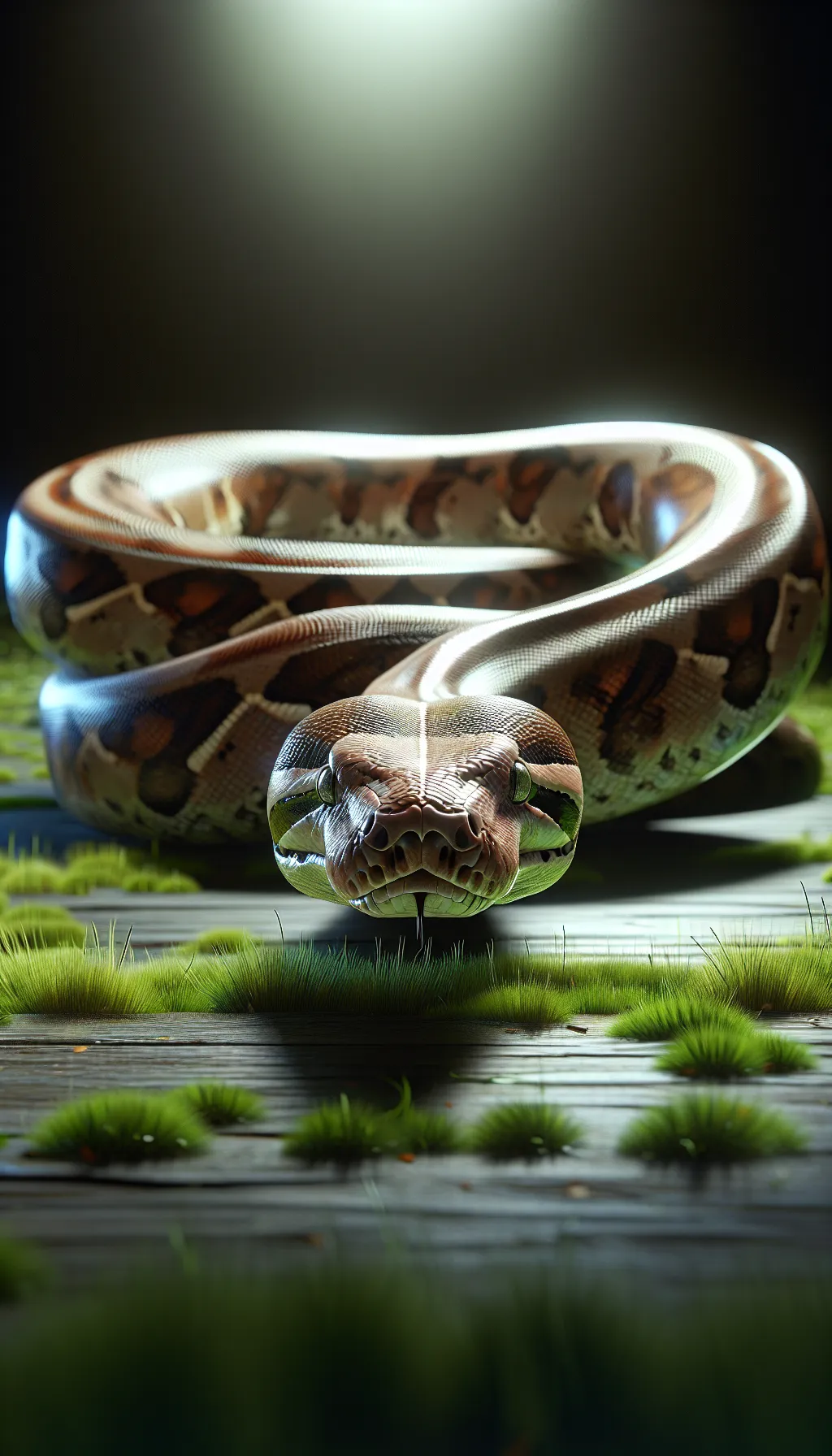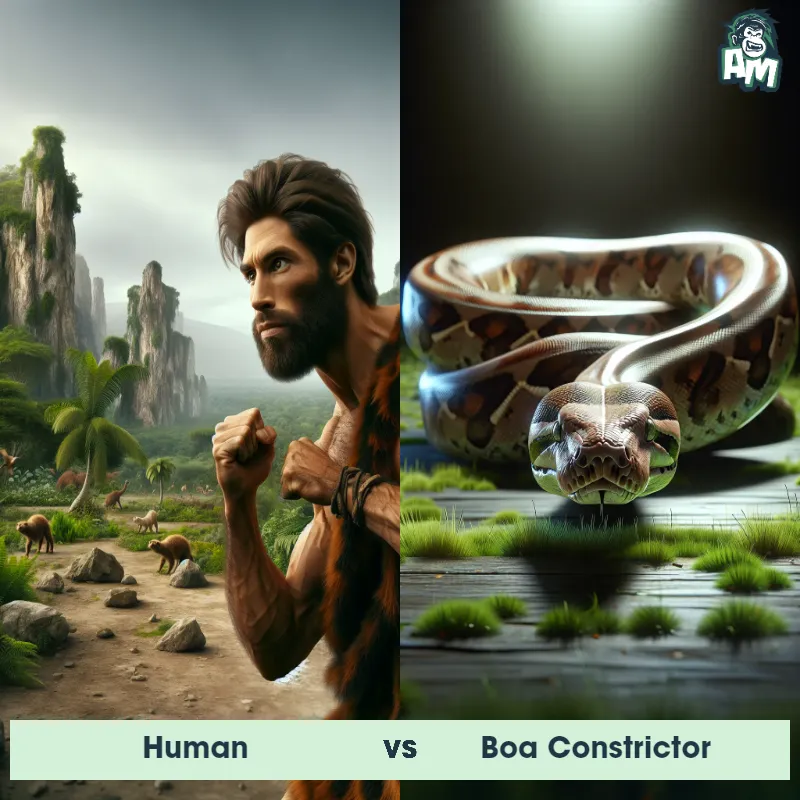The Boa Constrictor
The Boa Constrictor is a large, non-venomous snake known for its impressive size and strength. They have a thick body with a distinctive pattern of brown or tan markings on a lighter background. Boas are great swimmers and climbers, and they use constriction to suffocate their prey before consuming them whole.

| Boa Constrictor | |
|---|---|
| Size | Up to 13 feet (3.9 meters) |
| Weight | Up to 60 pounds (27.2 kilograms) |
| Speed | 20-30mph (32-48km/h) |
| Key Strength | Constriction |
| Biggest Weakness | Vulnerability to attacks from predators |
| Scientific Name | Boa Constrictor |
| Family | Boidae |
| Habitat | Tropical regions |
| Geography | Central and South America |
| Diet | Birds, mammals, other reptiles |
| Lifespan | 20 years - 30 years |

The Boa Constrictor
The Boa Constrictor is a large, non-venomous snake known for its impressive size and strength. They have a thick body with a distinctive pattern of brown or tan markings on a lighter background. Boas are great swimmers and climbers, and they use constriction to suffocate their prey before consuming them whole.
Fun Fact: Boa Constrictors have specialized teeth that curve backward to help grip onto their prey while constricting them.
| Boa Constrictor | |
|---|---|
| Size | Up to 13 feet (3.9 meters) |
| Weight | Up to 60 pounds (27.2 kilograms) |
| Speed | 20-30mph (32-48km/h) |
| Key Strength | Constriction |
| Biggest Weakness | Vulnerability to attacks from predators |
| Scientific Name | Boa Constrictor |
| Family | Boidae |
| Habitat | Tropical regions |
| Geography | Central and South America |
| Diet | Birds, mammals, other reptiles |
| Lifespan | 20 years - 30 years |
Boa Constrictor Matchups
We use AI to simulate matchups between the Boa Constrictor and other animals. Our simulation considers size, strength, and natural predatory behaviors to determine the most likely outcome.

Can't find the Matchup you want?
Create Your Own MatchupBoa Constrictor: Diet, Predators, Aggression, and Defensive Behaviors
What do Boa Constrictors eat?
Boa Constrictors are carnivorous snakes known for their ability to constrict their prey. They primarily feed on a diet of small to medium-sized mammals, birds, and reptiles. Some larger Boa Constrictors have been known to feed on prey as large as deer and pigs. They are ambush predators, relying on their powerful bodies to wrap around their prey and squeeze it until it suffocates.
Do Boa Constrictors have any predators?
While Boa Constrictors are apex predators in their habitats, they do have some natural predators. Young Boa Constrictors are vulnerable to predation by birds of prey, larger snakes, and mammals. Adult Boa Constrictors are less likely to be preyed upon due to their size and strength, but jaguars and cougars have been known to successfully hunt and consume these snakes.
Are Boa Constrictors aggressive?
Boa Constrictors are generally docile and non-aggressive snakes when left undisturbed. However, they may display defensive behavior when feeling threatened or cornered. In captivity, Boa Constrictors can become more accustomed to handling and human interaction, thus reducing their defensive tendencies.
Do Boa Constrictors fight?
Boa Constrictors are not known for engaging in fights with other snakes or animals unless it is for territorial disputes or during mating season. They are solitary creatures for the most part and prefer to avoid confrontation if possible. When threatened, a Boa Constrictor will usually try to retreat rather than fight.
How do Boa Constrictors defend themselves?
Boa Constrictors have several defense mechanisms to protect themselves from potential threats. Their primary defense is to rely on their camouflage and stealth to avoid detection. When threatened, a Boa Constrictor may hiss, strike, or bite to deter predators. If necessary, they will use their strong bodies to constrict and suffocate the threat.
What is a Boa Constrictor's biggest weakness in a fight?
Despite their strength and powerful constricting abilities, Boa Constrictors have a major weakness in the form of vulnerability to injury. Their bodies are susceptible to damage from sharp objects, bites, or other forms of trauma. In a fight, a Boa Constrictor may be at a disadvantage if its body is injured, affecting its ability to constrict prey or defend itself effectively.
Fun Fact: Boa Constrictors are ovoviviparous, meaning they give birth to live young rather than laying eggs.
Fun Fact: Boa Constrictors are ambush predators, using their keen sense of smell to track down prey and strike with lightning speed.











